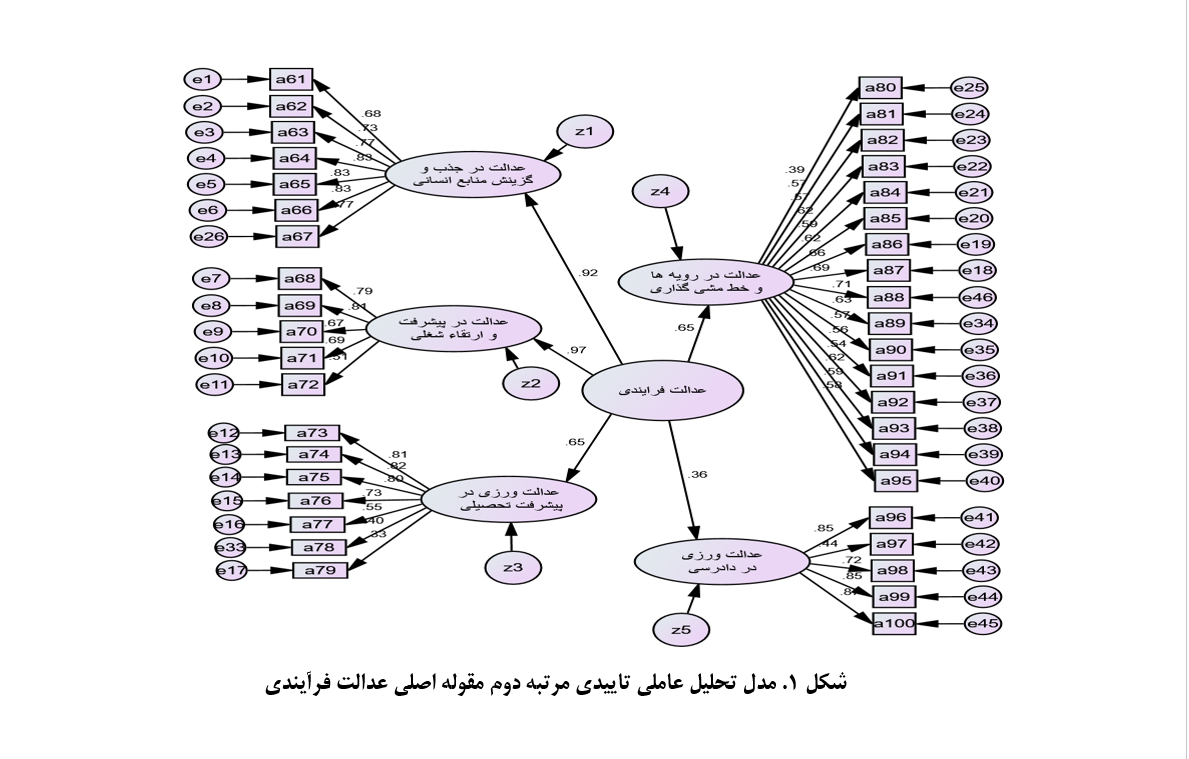Validating the Educational Equity Model for the Education System of Iraq
Keywords:
Education, Education System of Iraq, Educational EquityAbstract
The present study aimed to design and validate an educational equity model for the education system of Iraq. This research, based on its objective, is categorized as applied research and is descriptive-survey in terms of data collection methodology. The statistical population consisted of all schoolteachers in Iraq, totaling 1,122,345 individuals. From this population, based on Krejcie and Morgan's table (1970), a sample size of 384 participants was selected. The sampling method employed was cluster sampling. A researcher-designed questionnaire was utilized as the data collection tool. To examine the validity of the measurement tool, two methods were used: content validity (face validity) and construct validity (confirmatory factor analysis approach). Data analysis was performed using the confirmatory factor analysis approach with Amos software. The findings revealed that confirmatory factor analysis of the equity category in the domains of students, parents, teachers, and administrators indicated that the primary concept of "students" had a path coefficient of 0.98, "teachers" had a path coefficient of 0.52, "administrators" had a path coefficient of 0.35, and "parents" had a path coefficient of 0.92. These concepts exhibited strong correlations with the factor "equity in human resources," making them strong indicators for measuring this factor. Additionally, the p-values for all primary concepts within this factor were less than 0.05, signifying a significant relationship between each category and its higher-order factor. It can be concluded that addressing the indicators and variables discussed in this study is essential for achieving social equity, and planners must pay serious attention to them.
Downloads
References
Asghari Bahambari H. Comparative Study of Educational Justice Policy in Malaysia and Iran. Comparative Studies
on Teacher Education (International Exploration Journal). 2023;2(1):55-84.
Ghasemi Ardehani A, Heydarabadi A, Rostami N. Family Backgrounds and Inequality of Educational Opportunities:
A Case Study of Female Secondary School Students in Ahvaz. Specialized Sociology Journal. 2013;1(1):127-47.
Papastephanou M, Zembylas M, Bostad I, Oral SB, Drousioti K, Kouppanou A, Tesar M. Philosophy of education in
a new key: Education for justice now. Educational Philosophy and Theory. 2022;54(8):1083-98. doi:
1080/00131857.2020.1793539.
Brighouse H, Unterhalter E. Measuring Justice: Education for primary goods or for capabilities?: Cambridge
University Press; 2010. 193-214 p.
Bezi A, Fakoori H, Bayani AA, Saemi H. Design and Validation of an Environmental Education Curriculum Model
for Higher Education Based on the "Aker" Approach. Iranian Journal of Educational Sociology. 2024;7(1):79-90. doi:
61838/kman.ijes.7.1.8.
Shariati F, Niazazari K, Jabbary N. Presenting a Model for Virtual Education Considering Educational Equity with a
Phenomenological Approach in Schools of Golestan Province. Iranian Journal of Educational Sociology. 2024;7(1):66-78. doi:
61838/kman.ijes.7.1.7.
Capatono J. The challenges of equity in public education. 2017.
Yamani N, Shaterjalali M, Eghbali B. Educational justice from the perspective of postgraduate students in a medical
school in Iran: A qualitative study. Research and Development in Medical Education. 2017;6(1):23-8. doi:
15171/rdme.2017.005.
Culp J. Educational justice. Philosophy Compass. 2020;15(12). doi: 10.1111/phc3.12713.
Bayat G, Ghasemi M. Conceptualization of Justice in Iranian Educational System: A Case Study of Elementary and
Secondary Schools' Text Books. Majlis & Rahbord. 2020;26(100):7-46.
Babadi Akasheh Z, Sharif SM, Jamshidian A. Providing and Extending Equal Opportunity and Educational Justice in
Education in Isfahan. Social Welfare. 2010;10(37):287-305.
Alaghehband A. Public administration. Tehran: Ravan Publication; 2019.
Sikandar A. John Dewey and his philosophy of education. Journal of Education and Educational Development.
;2(2). doi: 10.22555/joeed.v2i2.446.
Carley-Rizzuto K. bell hooks and Picture Books: Equity in Early Childhood Education. Early Years. 2022:1-12. doi:
1080/09575146.2022.2104818.
Freire P. Pedagogy of the oppressed In - Toward a sociology of education: Routledge; 2020. 374-86 p.
Rah Najat M, Negarestani MH. Examining Educational Justice in Light of the Law on the Establishment and
Management of Private Schools and Educational Centers. Public Policy Quarterly. 2024;10(1):143-57.
Roshan H, Shahraki Pour H, Dukanehifar F. A Model for Improving Teachers' Job Performance Based on Educational
Justice. Scientific Journal of Teaching and Learning Research. 2023;18(74):23-40.
Ahmadi M, Hazaarjiri J, Rahimi Adargani M, Tabaqiyan Gomi P. Culture, Educational Justice, Educational
Efficiency: A Meta-Analysis of Studies on Public and Private High Schools. Sociology of Culture and Arts. 2023;5(4):119-41.
Kaki M, Sadr A, Alizadeh Mofrad SM. The Impact of Educational Justice on Academic Performance, Satisfaction
with Education, and Academic Progress of Male Students in Secondary Schools in Abdanan. Specialized Social Studies
Education Research Quarterly. 2022;4(13):31-50.
Ghoreishi Ma-S, Nazari Zadeh Zar M, Bahrami B. Examining Educational Justice in Public Schools in Tehran.
Scientific Research Journal of School Management. 2021;9(1):265-80.
Torkashvond S, Yariqoli B, Moradian Mohammadiyeh W. Explaining the Challenges of the Digital Divide in
Implementing Educational Justice. Educational Technology. 2022;16(2). doi: 10.22061/tej.2021.7363.2527.
Pahang N, Mahdioun R, Yarigholi B. Investigating the Quality of Schools and Identifying Related Affecting Factors:
A Mixed Method Research. Journal of School Administration (JSA). 2017;5(1):173-93.
Pan X, Chen M, Hao Z, Bi W. The Effects of Organizational Justice on Positive Organizational Behavior: Evidence
from a Large-Sample Survey and a Situational Experiment. Organizational Psychology Journal. 2018;8:1-16. doi:
3389/fpsyg.2017.02315.
Sheikh T, Kor F, Saqainia A. The model of virtual education with an emphasis on educational justice during the corona
pandemic. Studies in Psychology and Educational Sciences (Center for the Development of Modern Education in Iran).
;8(2):248-68.
Kayaalp D. Educational justice praxis and cultural competence. European Journal of Social Science Education and
Research. 2022. doi: 10.26417/531kqr68w.

Downloads
Published
Submitted
Revised
Accepted
Issue
Section
License
Copyright (c) 2024 Journal of Study and Innovation in Education and Development

This work is licensed under a Creative Commons Attribution-NonCommercial 4.0 International License.










